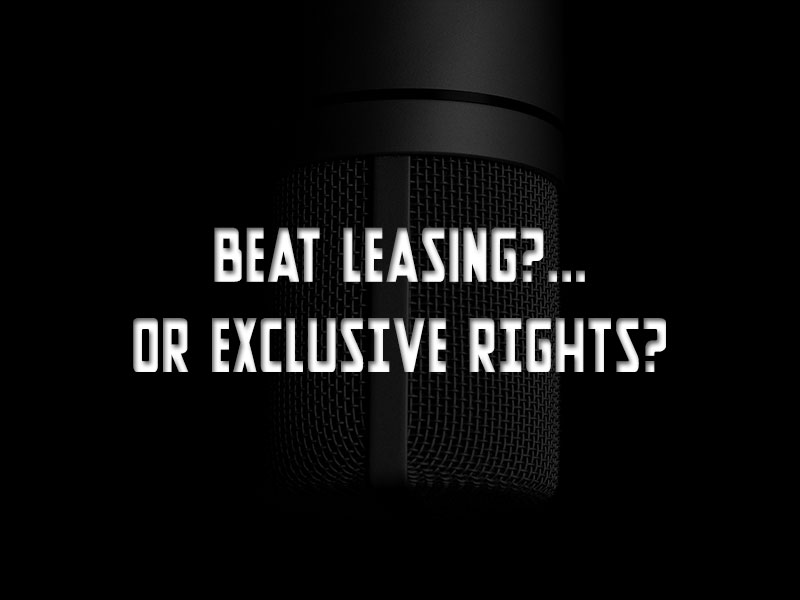Beat Leasing or Exclusive Rights? What to Know in 2026
Get to know the difference between leasing and buying exclusive rights for beats online. Download professional music contracts today.
Should you lease beats or purchase exclusives?
Understand the agreement made between the Artist & Producer and have a look into the contracts that bind them.
Whether you’re leasing beats (non-exclusive) or purchasing the exclusive rights to it, these are both great ways to secure an instrumental to use for your own project. The extent to which you can use it will be outlined in the beat lease / exclusive rights contract specific to the producer.
Most producers have various pricing tiers from leasing a beat all the way to selling the exclusive rights to a beat, which gives you the most freedom and control as an artist.
Both options have their respective advantages. I’ll explain to you the pros/cons, and best uses of each of these beat contracts. This will give you a better understanding and help you feel comfortable with deciding which option is best for you at this point in your career.
Let’s get started!
Leasing Beats (Non-Exclusive)
What is a Beat Lease?
A beat lease or beat license is a contract (agreement between producer and artist/label) that allows the artist to use an instrumental beat to record a unique song or ‘Master Recording’ for use in demos, mixtapes, promotional use, etc. With beats for lease, beat leases always come with limitations on distribution amounts (number of sales) and rights.
Basic rights: With a beat leasing contract, the producer maintains full ownership and may continue to sell the instrumental until an exclusive license is purchased for it, after which it can no longer be sold again. Any artists who had leased the beat before the exclusive was purchased would not be affected until their beat lease contract reaches it's termination deadline.
Pros: Leasing beats is the most affordable way for a budding artist to get quality music production for their mixtape, EP, single, etc. Rather than using recycled mainstream instrumentals, beats with producer tags all over them or having to save up for an exclusive, beat leasing gives you the opportunity to listen around for the sound and quality you need at a price everyone can afford.
With the beat leasing contract you’re still able to receive all royalties & publishing owed to you as an artist that is generated from sales of your master recording through streaming services (Spotify), digital retailers (iTunes), etc.
Producer’s leasing beats to artists usually have various pricing levels to choose from. For example, I have 3 tiers of beat leasing options available on Pooksomnia, all depending on an artists needs – Basic, Standard & a Pro Unlimited Lease (Pictured below).
Cons: Many producers or lower level beat leases often only deliver an .mp3 or .wav file of the beat, which gives you less quality and freedom to work with the instrumental when moving into the final mixing and mastering stage.
Beat leases are also able to be sold by producers for as long as they choose or until an exclusive is purchased for it, giving more opportunity for other artists to grab the same beat.
A non-exclusive is subject to the terms and limits within your contract. For example, if your lease allows you to sell 7000 copies of your single for profit, once that 7000 is reached, you must re-purchase the beat lease or upgrade to exclusive rights. If you're not careful and your song takes off the producer could potentially take your earnings for sales above 7000 units.
Who Uses Beats for Lease?
Beat leasing is a popular option for artists beginning their careers and independent artists who need access to affordable music production. Finding beats for lease is a great option if you want to get your music out there to build up your fan base and catalogue. On the other hand, if you’re ready to level up, invest in yourself and are preparing to release an album with a budget behind it, exclusive rights would be your best option.
Beat Lease Contract
Have a look at an example beat leasing contract below to get a general visualization and better understanding of what the artist & producer may agree upon.
Exclusive Rights for Beats
What are Exclusive Beats?
Exclusives, or exclusive rights for a beat, legally names the artist as the exclusive owner to use it in creating a 'Master Recording'. It’s bound by contract and gives you as an artist full ownership of the beat to the extent that you will be the last person to purchase it.
Basic rights: The artist has exclusive rights to the instrumental and the producer can no longer legally sell it to anyone else.
Pros: You have full ownership over the beat, it will be removed from the site, not available for anyone else to purchase. As well, this contract will never expire.
Exclusive beats are delivered with the absolute highest of quality and should include all of the stems (individual instruments) of the beat as well as an .mp3 and/or a .wav file of the full beat for reference. This gives you or your music engineer the ability to tweak and customize the instrumental for your overall desired sound & quality.
Unlike beat leasing options, having exclusive rights to a beat gives you complete freedom over - the number of music videos you can use the with the instrumental, for-profit-shows, radio play and gives you an unlimited distribution limit of your master recording.
Cons: Since this type of license has a lot more value to it, it takes it a much bigger initial investment than leasing beats.
Who needs Exclusive Beats?
Professional artists, Independent artists with a budget and Breakout-ready-artists. Having exclusive rights to a beat is necessary when you’re at the level when you expect to sell more songs than the beat leasing distribution limits or have a marketing and promotional budget behind your project.
Exclusive Rights Beat Contract
This is used to bind an agreement made between producer(s) and artist or labels for exclusive rights to a beat.
If your contract is well constructed and understood by all parties, you can prevent being taken advantage of with regards to who owns the beat, who has the rights to use the beat and how any royalties earned would be split.
Need help understanding the contract? I break down the exclusive rights agreement Here.
As an artist, you wouldn’t want your producer to sell you exclusive rights to a beat, and then have the producer sell that same exclusive beat to someone else…
As a producer, you wouldn’t want an artist to not credit you properly or use your instrumental in ways that you did not agree upon…
Hopefully none if this happens to you,
But review your exclusive rights beat contract and refer back to it if any legal issues arise. Keep your music business tight.
Conclusion
So there you have it, both sides of what beats for lease are versus exclusive beats, how artists are using them, and why you may choose one over the other.
You always want to make sure you’re safe by having the required permission to use an instrumental beat. If you don’t have the rights to use a beat and start making substantial profit off of a song you wrote to, the producer can legally get your song taken down, and potentially take further legal action against you for copyright infringement.
It’s just better to play it safe especially if you want to take your music career seriously or keep a good working relationship with your producer for future collabs.
In short, I recommend leasing beats if you don't have a big budget and want to build your name up before going all in, especially if you need multiple beats. Once you're making money from your music, have found your sound, audience and expect to move more units than the beat lease limits allow, definitely go for an exclusive rights contract.
I hope this article has helped you gain a better understanding of beat leasing vs. exclusive rights contracts.
As always, If you have any topics I should cover or questions, let me know in the comments.
Take it easy,
- P
Helping music creators succeed in the new music industry.
Join the Members Area

